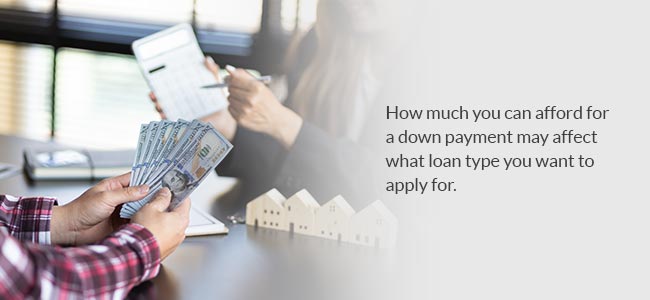If you are a first-time homebuyer, you may be struggling to save for the purchase of your home. Between a down payment, closing costs and homeowners insurance, saving for a home purchase can feel overwhelming. However, buying your first home can become more affordable when you understand what your minimum down payment can be. In fact, you may even be eligible for options that allow you to skip a down payment altogether.
At Homesite Mortgage, we want your mortgage to be as affordable as possible. We’ve put together this guide to help you through the process of securing your first home loan, from how much you’ll need for your down payment to what loan options may be available to you.
How Much Down Payment Is Needed to Buy a House?
Buying a home involves a number of one-time costs, including your:
- Down payment: A down payment is the cash you pay for your home purchase on closing day when you transfer the money and receive the keys to your new house. Since a down payment is often a substantial sum, you will typically pay it via a cashier’s check or wire transfer.
- Renovations: If you plan on making renovations before you move in, such as painting or laying down flooring, you will want to have some savings put aside to cover those expenses.
- Moving costs: Whether you’re moving across town or across the country, you will have expenses associated with the move. If you will be paying professional movers to transport your belongings to your new home, you should also have savings set aside for this expense.
- Closing costs: Closing costs are the fees you pay when you close on your home. Keep in mind that these costs can be negotiable.
Closing costs you may be responsible for paying when you close on your home include your:
- Mortgage interest
- Lender fees
- Property taxes
- Real estate attorney fees
- Homeowners insurance
- Credit report fee
- Transfer tax
- Home inspection fee
- Property appraisal fee
- Title search fees
After you put a payment down, you will use your home loan to pay for the rest of your home’s purchase price. Most mortgages require a down payment, but some home loan types allow you to borrow with no money down. You will typically see down payments expressed as percentages of your home’s price. For example, a 20% down payment on a $150,000 home would be $30,000.

Loan Options for a First-Time Homebuyer
Saving for a down payment is one of the biggest financial hurdles many first-time homebuyers face. Your minimum down payment will vary based on a few factors, such as your lender, finances, priorities and mortgage type. While making a larger down payment offers some benefits, putting all your savings toward a down payment could put you in a difficult financial position. It may also leave you unable to cover your closing costs or the cost of maintenance and repairs.
As a first-time homebuyer, you may have a few home loan options, including a Federal Housing Administration (FHA) loan, conventional loan, USDA loan and Veterans Affairs (VA) loan.
1. FHA Loan
Though FHA loans are open to anyone who qualifies, they can allow for lower down payments, which makes them an excellent option for first-time homebuyers. Since the Federal Housing Administration insures FHA mortgages, they offer a lower risk for lenders. As a result, lenders can pass on opportunities for saving to you through lower down payments.
FHA loans’ flexible credit score and minimal cash investment requirements make them a good option for recent graduates, newlyweds or homeowners who earn a lower annual income. You may qualify for an FHA loan even if you have a score as low as 580. If you are pursuing homeownership but don’t have the savings for a 20% down payment, an FHA loan may be the right option for you.
2. Conventional Loan
A conventional loan is an excellent home loan option if you have a stellar credit score and you’re looking for a lower interest rate. A conventional mortgage adheres to the guidelines set by Fannie Mae and Freddie Mac, which may limit how much you can borrow depending on the county in which you plan to purchase a home. However, you will have more flexibility in how you structure your mortgage.
3. USDA Loan
If you qualify for a USDA loan, you can use it to purchase a home outside of city limits in a rural or suburban area. More houses are eligible for a USDA loan than many homebuyers realize. Though the USDA does not require a minimum credit score to qualify, most lenders require a credit score of at least 620.
4. VA Loan
The U.S. Department of Veteran Affairs guarantees VA home loans. If you are eligible for a VA loan because you or your spouse is a qualifying veteran, you may want to apply. Our in-house VA underwriters approve 98% of VA loans for borrowers with credit scores of at least 600.

Down Payments Required for Each Loan Type
A down payment for a first-time homebuyer can vary depending on the type of loan. For example, while you may be required to put down a larger down payment for a conventional loan, you may be able to put a low or even no down payment on other home loans. Here are some general guidelines for the loans above:
- FHA home loan: You may be able to get an FHA home loan for just 3.5% down. At Homesite Mortgage, we have special grants and programs available for FHA loans that allow for lower down payments. You can qualify with a credit score as low as 580, though you will need to pay private mortgage insurance (PMI) no matter how much you put down.
- Conventional home loan: The down payment for a conventional loan can sometimes be as low as 3%. Requirements for a conventional loan vary by lender. At Homesite Mortgage, you may qualify for a 3% down payment if you have good credit. However, you can skip PMI if you put at least 20% down.
- USDA home loan: If you qualify for a USDA loan, you can purchase your property with no money down. A USDA loan is intended for properties in qualifying suburban and rural areas. To avoid paying a down payment for a USDA loan, you need to meet the minimum qualifications. Keep in mind that you will still need to pay PMI.
- VA home loan: If you are eligible for a VA loan, you can buy your first home without a down payment. A VA loan is intended for former and current members of the Armed Forces, along with certain surviving spouses. To avoid paying a down payment for a VA loan, you must meet the minimum qualifications the Department of Veteran Affairs has set. There are also additional benefits available to those service members disabled from the forces.
How much you can afford for a down payment may affect what loan type you want to apply for. Alternatively, if you know you want a specific type of home loan, you will have an idea of how long you will need to save up for a down payment.
Zero Down Payment Options
In some cases, you may be able to purchase a home without a down payment. While you can’t get a conventional loan without a down payment, you may be eligible for a government-backed mortgage like a USDA or VA home loan. Since the government insures these loans, they present less risk to your lender. They know they’re covered for financial loss if you default on your loan, making them more willing to accept lower or zero down payments.
Along with USDA and VA home loans, there are almost 2,000 down payment assistance programs (DPA) across the nation. Research the area in which you are looking to purchase your first home. DPAs typically use your family size and household income to determine whether you qualify. Some are designed to assist people with disabilities and military veterans. Other DPAs have funding specifically for healthcare workers, teachers and fire and police personnel.
You may also be able to use gift funds for your down payment. Approved sources of financial gifts typically include family members like your parents and grandparents. You will need to ensure you have appropriate documentation for your financial gift, illustrating the funds going from the donor’s bank account to yours. You will also need to provide a signed and dated gift letter. This letter should state the amount of your financial gift and that you are not expected to pay the funds back.

What Happens if You Put More Than the Minimum Down?
Putting more than the minimum down on your first home can often be beneficial. By doing so, you can:
- Save money through a lower interest rate: You may get a better interest rate for your mortgage when you make a larger down payment. Since you’ll be borrowing less money from your lender, the lender is taking on less risk. They can reward you for this lower risk with a better rate and more favorable terms.
- Save on the lifetime of your loan: Making a down payment means the total amount you borrow for your home purchase will be less, and your monthly mortgage payment will be lower. Since you will be borrowing less, you will also be paying less interest. All of this means you will be saving more money on the lifetime of your mortgage.
- Skip PMI: If you make a large enough down payment, you may be able to skip paying PMI. Avoiding PMI can result in monthly savings over the duration of your loan.
- Start out with more equity in the house: When you make a down payment, you will immediately have equity in your home. Equity is the value of your home minus how much you owe on your loan. When you have more equity, you have more wealth. You may also be able to tap into this equity.
However, if you can make a low down payment or avoid one altogether, you may be able to speed up the homebuying process as you will need less time to save. A more significant down payment may also mean you’re taking on more financial risk if you are tapping into your emergency fund savings.
Before you decide how much you want to put down on your home, weigh the pros and cons of larger and smaller down payments. Use our mortgage payment calculator to calculate how your down payment will affect your monthly rates.
Homesite Mortgage Is an Expert at Getting the Best Loan Terms for Your Goals
At Homesite Mortgage, we can help you get the best mortgage rates and terms for your goals. When you choose us as your lender, you can enjoy the following benefits:
- You can save more money with our closing costs and interest rates.
- Our licensed mortgage bankers can provide mortgage advice.
- Our mortgage process is simple and fast, so you can usually close within 18 to 20 days.
- Our technology is designed to keep your confidential information safe and save you time.
We also offer grants and programs that can benefit you and get you even lower down payments. For example, our BudgetWise program allows for little money down and discounted PMI. We also have other programs and methods to get lower down payments. For example, we commonly work with real estate agents to recommend closing terms where the seller pays for most or all closing costs, which can help with the overall costs you will need at closing.

Contact Us at Homesite Mortgage
At Homesite Mortgage, we are your source for flexible lending criteria and great rates. Rather than a one-size-fits-all lender, you will get a lender who caters the borrowing experience to your unique needs. If you have excellent credit, we want to reward you with a lower interest rate. If you are dealing with some credit challenges, we want to give you an opportunity to begin anew.
Our team is comprised of proficient loan closers, skilled loan processors, licensed bankers and experienced underwriters. Contact us at Homesite Mortgage to speak with an expert today and learn more about our low down payment mortgage options.

